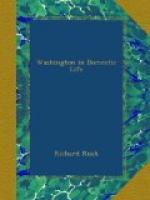Savannah, May 13, 1791. He here says that the continual hurry into which he was thrown by entertainments, visits, and ceremonies in the course of his southern tour, left him scarcely a moment he could call his own. He gives directions as to where his letters are to be sent that they may strike him at the proper points whilst travelling; his horses are much worn down, he says, by the bad roads, especially the two he bought just before leaving Philadelphia, “and my old white horse.”
Fredericksburg, Virginia, June 12, 1791. He informs Mr. Lear that he had reached this place the day preceding, and expected to get back to Mount Vernon the day following. He would remain there until the 27th, which was the day appointed for him to meet the commissioners at Georgetown to fix on the spot for the public buildings to be erected in the new Federal City, and writes to give Mr. Lear this foreknowledge of his movements.
Mount Vernon, June 15, 1791. The early part of this letter relates to certain blank commissions signed and left with Mr. Lear to be filled up under the direction and advice of the Secretary of the Treasury. He next adverts to a vacancy in one of the United States judgeships—that of the district of Pennsylvania—by the death of the late incumbent. Some have applied, he says, for the appointment, and others will. In reference to this and other offices that will be vacant (naming them), he wishes Mr. Lear to get the best information he can as to those who it is thought would fill them “with the greatest ability and integrity.” Several meritorious persons, he adds, have already been brought to his view.
He is glad to hear that the affairs of his household in Philadelphia go on so well, and tells Mr. Lear it might not be improper for him to hint how foolish it would be in the servants left there to enter into any combinations for supplanting those in authority [meaning the upper servants]. The attempt would be futile, and must recoil upon themselves; and next, admitting that they were to make the lives of the present steward and housekeeper so uneasy as to induce them to quit, others would be got, and such, too, as would be equally if not more rigid in exacting the duty required of the servants below them; the steward and housekeeper were indispensably necessary in taking trouble off of Mrs. Washington’s hands and his own, and would be supported in the line of their duty, whilst any attempt to counteract them would be considered as the strongest evidence the other servants could give of their unworthiness. A good and faithful servant, he adds, was never afraid of having his conduct looked into, but the reverse.




